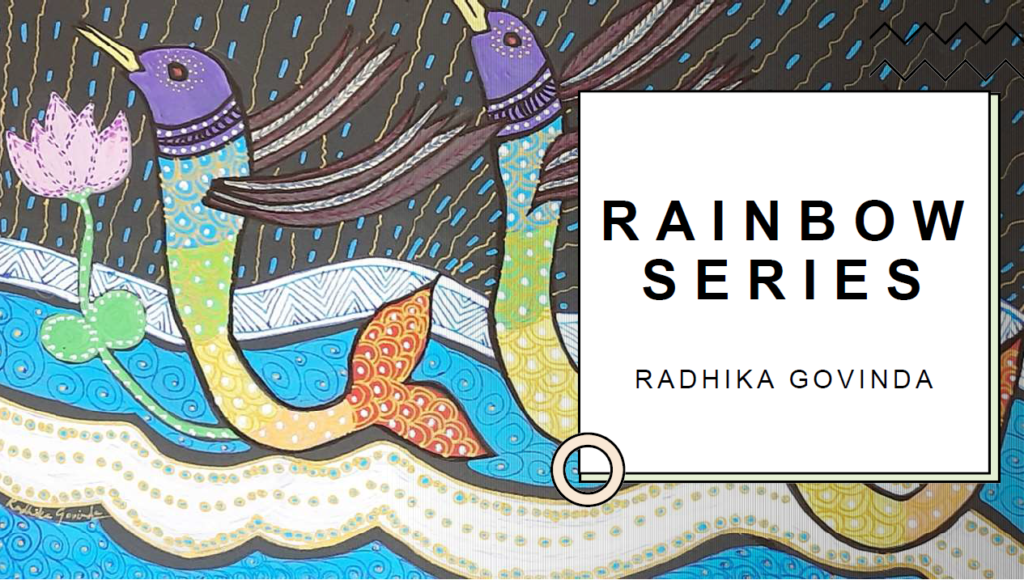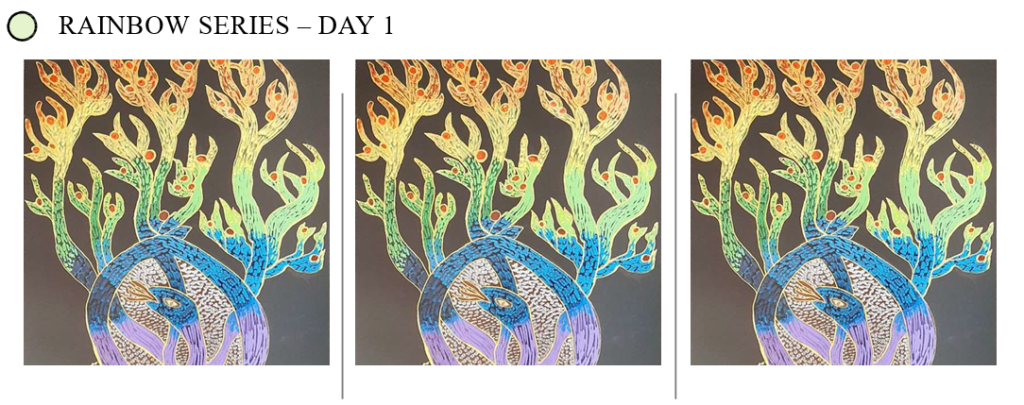

As the days and weeks passed, and as nurseries closed and schools moved teaching online, drawings and paintings of rainbows started to come up on our street, on the neighbouring streets, and as it would turn out, all over the UK, as if signalling that everything was going to be okay, that a beautiful rainbow awaits us at the end of this storm that is the covid-19 pandemic.
My 4.5 year old and I too made a rainbow and put it up on our living room window. As the pandemic has stretched on, we have made several more, and now every window in our home is adorned with a handmade rainbow.
In the first instance, it is these rainbows that inspired this series of artwork, as I painted alongside my child. Hence the use of the seven colours of the rainbow in each piece.
Soon what I loosely call ‘painting’ became a creative outlet for the gamut of feelings I was experiencing – fear, anger, frustration, anxiety – and seeking – hope, resilience, comfort, calm. It helped get over migraines brought on by the stress of unending spirals of work and of anxiety about my family’s and my own wellbeing that even multiple doses of paracetamol couldn’t resolve. It enabled me to express the snatches of thoughts I struggled to coherently articulate in words, especially in those early days of the pandemic. Painting was cathartic. It was relaxing. It feels like a long-lost friend I have reconnected with after the passage of many years. Why did we ever drift apart? Painting has been a lifeline in these disturbing times.

But I am no artist. If you asked me about my distinct style, I would say that I don’t have one. What I have attempted with ordinary acrylic paint pens in this series is an amalgam inspired by gond, madhubani and tinga tinga artists and art forms.
There are seven pieces of artwork in this series. The symbolism of the rainbow or the seven colours of the rainbow appear in each piece. Over the next seven days, I will post one piece and accompanying reflections every day, in keeping with the symbolism of the seven colours of the rainbow.


Today’s artwork is titled: ‘Anthropocene’.
The Australian bushfires just before, and the oil leak in the Arctic circle, the recurring earthquakes, swarms of locusts and devastating cyclones in the South Asian subcontinent during the ongoing pandemic are all manifestations of climate change. Is the pandemic nature’s way of disrupting the world’s march towards unbridled capitalism? Is it the warning that we, as humankind, must heed if we are to survive?

Anthropocene/
The serpent carries within her the earth.
The tree of life grows on her.
Disturb her, and life as we know it is shaken.
Inspired by Ram Singh Urveti’s ‘The Tree of the Serpent Goddess’ from Bajju Shyam, Durga Bai and Ram Singh Urveti’s (2006) The Night Life of Trees, Chennai: Tara Books.

Radhika Govinda is a feminist sociologist whose work is on the gender politics of development, intersectionality and feminist knowledge production. She lives and works in Edinburgh, and can be reached at Radhika.Govinda@ed.ac.uk. Twitter: @GovindaRadhika
